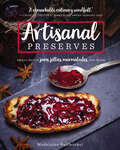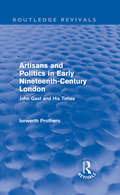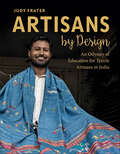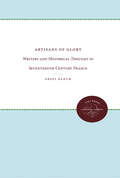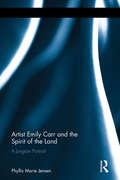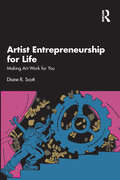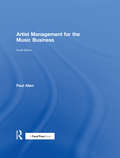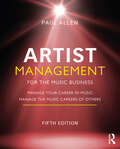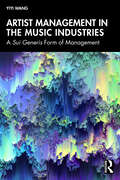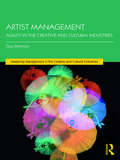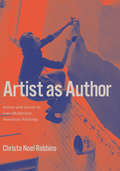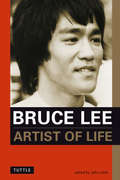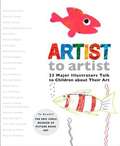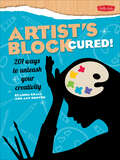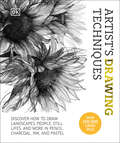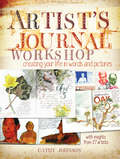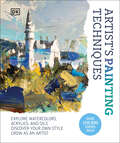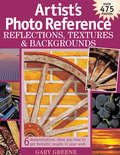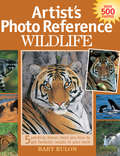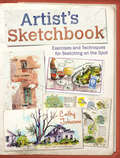- Table View
- List View
Artisanal Preserves: Small-Batch Jams, Jellies, Marmalades, and More
by Madelaine Bullwinkel&“Madelaine makes it clear and easy to go from perfectly ripened fruit to stunningly delicious jams and jellies.&” —Gale Gand, James Beard Award–winning pastry chef A how-to guide that is perfect for eager cooks and seasoned preservers alike, providing one-hundred foolproof recipes for jams, jellies, marmalades, and more. For those new to the craft, it includes a primer on the history and basic technique of preserving. Experienced canners will appreciate new flavor combinations—such as Lime Zucchini Marmalade and Blackberry Ginger Preserves—as well as forty recipes for breads, muffins, and desserts that make good use of your new jams and jellies. Additionally, most of the recipes avoid using commercial pectin, which means you can use less sugar or, in some cases, none at all. Since Artisanal Preserves was originally published in 2005, the popularity of home preserving has continued to rise along with renewed interest in other old-fashioned craft cooking hobbies, such as brewing beer, pickling produce, and making sourdough starters. Bullwinkel&’s thorough teaching style and time-saving techniques make the preserving process surprisingly simple. Artisanal Preserves is the go-to primer for making elegant, delicious fruit preserves at home. &“A remarkable culinary windfall.&” —Charlie Trotter, James Beard Award–winning chef
Artisans and Politics in Early Nineteenth-Century London: John Gast and his Times (Routledge Revivals)
by Iorwerth ProtheroFirst published in 1979, this book was the first, full-length study of working-class movements in London between 1800 and the beginnings of Chartism in the later 1830s. The leaders and rank and file in these movements were almost invariably artisans, and this book examines the position of the skilled artisan in politics. Starting from the social ideals, outlook and the experience of the London artisan, Dr Prothero describes trade union, political, co-operative, educational and intellectual movements in the first forty years of the century. Setting a scene of alternating growth and contraction in trade, successive hostile governments and the increasing articulation of working-class consciousness the author shows that artisans could be no less militant, radical or anti-capitalist than other groups of working class men.
Artisans by Design: An Odyssey of Education for Textile Artisans in India
by Judy FraterA firsthand account of the development of Kala Raksha Vidhyalaya—the first design school for traditional artisans in India—and its evolution to present-day Somaiya Kala Vidya, with personal stories of its students, their work and the school's effect on their lives and India's cultural and economic development. Somaiya Kala Vidya was conceived as a place where textile artisans in the Kutch District—a rugged arid region of western India known for its rich craft traditions—could learn design, business, and management in hands-on ways that strengthened their traditional knowledge, explore ecological methods of creating, and discover ways to connect to contemporary markets while sustaining their cultural heritage. Artisans by Design presents intimate stories of more than 20 artisans (intertwined with the author's story), detailing how their education brought them personal fulfillment, increased social and economic status, and an understanding of sustainability. Readers will learn: • How Somaiya Kala Vidya and Kala Raksha Vidhyalaya affected the lives and work of artisan students, both individually and as part of the larger craft communities of the Kutch District • The challenges and triumphs of founding, running, and maintaining the school • How outside forces—societal, political, environmental, and cultural—profoundly impacted the school and each student • And more More than 200 color photographs of the artisans and their work bring you an intimate view of this unique institution and the lives and works of its graduates.
Artisans of Glory: Writers and Historical Thought in Seventeenth-Century France
by Orest RanumRanum analyzes the canons of writing history and describes the lives and achievements of the royal French historiographers. He examines the manner in which these writers described and, in some sense, created the glory that surrounded the lives of the nobility, hoping by so doing to enhance their own glory. Through studying the careers of these men, the author demonstrates how rhetorical, ideological, and social beliefs determined the way history was written.Originally published in 1980.A UNC Press Enduring Edition -- UNC Press Enduring Editions use the latest in digital technology to make available again books from our distinguished backlist that were previously out of print. These editions are published unaltered from the original, and are presented in affordable paperback formats, bringing readers both historical and cultural value.
Artist Animal (Posthumanities #25)
by Steve BakerAnimals have always been compelling subjects for artists, but the rise of animal advocacy and posthumanist thought has prompted a reconsideration of the relationship between artist and animal. In this book, Steve Baker examines the work of contemporary artists who directly confront questions of animal life, treating animals not for their aesthetic qualities or as symbols of the human condition but rather as beings who actively share the world with humanity.The concerns of the artists presented in this book—Sue Coe, Eduardo Kac, Lucy Kimbell, Catherine Chalmers, Olly and Suzi, Angela Singer, Catherine Bell, and others—range widely, from the ecological to the philosophical and from those engaging with the modification of animal bodies to those seeking to further the cause of animal rights. Drawing on extensive interviews he conducted with the artists under consideration, Baker explores the vital contribution that contemporary art can make to a broader conception of animal life, emphasizing the importance of creativity and trust in both the making and understanding of these artworks.Throughout, Baker is attentive to issues of practice, form, and medium. He asks, for example, whether the animal itself could be said to be the medium in which these artists are working, and he highlights the tensions between creative practice and certain kinds of ethical demands or expectations. Featuring full-color, vivid examples of their work, Artist Animal situates contemporary artists within the wider project of thinking beyond the human, asserting art&’s power to open up new ways of thinking about animals.
Artist Emily Carr and the Spirit of the Land: A Jungian Portrait
by Phyllis Marie JensenEmily Carr, often called Canada’s Van Gogh, was a post-impressionist explorer, artist and writer. In Artist Emily Carr and the Spirit of the Land Phyllis Marie Jensen draws on analytical psychology and the theories of feminism and social constructionism for insights into Carr’s life in the late Victorian period and early twentieth century. Presented in two parts, the book introduces Carr’s émigré English family and childhood on the "edge of nowhere" and her art education in San Francisco, London and Paris. Travels in the wilderness introduced her to the totem art of the Pacific Northwest coast at a time Aboriginal art was undervalued and believed to be disappearing. Carr vowed to document it before turning to spirited landscapes of forest, sea and sky. The second part of the book presents a Jungian portrait of Carr, including typology, psychological complexes, and archetypal features of personality. An examination the individuation process and Carr’s embracement of transcendental philosophy reveals the richness of her personality and artistic genius. Artist Emily Carr and the Spirit of the Land provides captivating reading for analytical psychologists, academics and students of Jungian studies, art history, health, gender and women’s studies.
Artist Entrepreneurship for Life: Making Art Work for You
by Diane R. ScottHolistically addressing the documented needs of practicing artists, this book applies contemporary business management principles to the unique circumstances of people who make their living through creative expression.Artists looking to forge a career have had to turn to either entrepreneurship resources or professional practice tools specific to a discipline such as studio arts or theatre—but the business-school entrepreneurial approach conflicts with the way artists make work and the unique structures of the artist environment, while the professional practice focus neglects the necessary business theory and the wide range of ways artists create viable careers. For the first time, this book provides a comprehensive theoretical and practical foundation for understanding how artists create practices that endure. Employing a strategic management framework, the book spells out prevailing business strategies in marketing, finance, human resources, and the legal environment from an arts-specific and artist-friendly point of view. In a world of perpetually changing communication, distribution, and technology, it also offers a lasting framework and understanding of the broader arts economy, while highlighting contemporary tools and tactics to implement the theories in individual practices.Practicing artists and students preparing for a career in any of the arts disciplines will welcome the artist’s perspective and the many examples from the lives of working artists in a variety of endeavors, while instructors in arts management, administration, and entrepreneurship will appreciate this comprehensive text with research-based pedagogy addressing their needs.
Artist Management for the Music Business
by Paul AllenAnyone managing an artist’s career needs to be well versed and have a savvy understanding of the moving parts of the music business. You’ll learn how and why those moving parts "move," as well as how to manage and navigate a music-based career. Artist Management for the Music Business gives you a comprehensive view of how to generate income through music and how to strategically plan for future growth. The book is full of valuable practical insights. It includes interviews and case studies with examples of real-world management issues and outcomes. Updates to this new edition include the importance of online streaming to music careers, how anyone can effectively network, tools for successful negotiation, ways to identify and manage income sources, and guidance on the ever-changing social media landscape of the music business. This book gives you access to resources about artist management and the music business at its companion website, http://www.artistmanagementonline.com. There is no login, and the resources are updated regularly.
Artist Management for the Music Business: Manage Your Career in Music: Manage the Music Careers of Others
by Paul AllenAnyone managing an artist’s career needs to be well versed and have a savvy understanding of the moving parts of the music business. Learn how and why those moving parts "move," as well as how to manage and navigate a music-based career. Artist Management for the Music Business gives a comprehensive view of how to generate income through music and how to strategically plan for future growth. The book is full of valuable practical insights. It includes interviews and case studies with examples of real-world management issues and outcomes. Updates to this new edition include a new chapter for independent, self-managing artists, expanded and updated sections on networking, social media, and streaming, and a basic introduction to data analytics for the music business. This book gives access to resources about artist management and the music business at its companion website, www.artistmanagementonline.com.
Artist Management in the Music Industries: A Sui Generis Form of Management
by Yiyi WangArtist Management in the Music Industries: A Sui Generis Form of Management provides one of the first substantive, academic examinations of the role of an artist manager.This book deconstructs the nature of Artist Management, unveiling the pivotal role of the artist manager in creating and sustaining a dynamic environment referred to as the ‘Loop’, where success is realised by navigating four variables – Risks, Relationships, Emotions, and Expectations (2Rs and 2Es) – within and beyond the ‘Loop’. This book offers a new perspective on Artist Management as a sui generis discipline that does not fit easily inside standard conceptions of management.Featuring ethnography and interviews, this book sheds light on the realworld challenges and successes in the field. It is a must-read for researchers, students, and practitioners in the music business, music marketing, and artist management, offering invaluable insights into the practices that shape the cultural landscape.
Artist Management: Agility in the Creative and Cultural Industries (Mastering Management in the Creative and Cultural Industries)
by Guy MorrowArtists are creative workers who drive growth in the creative and cultural industries. Managing artistic talent is a unique challenge, and this concise book introduces and analyses its key characteristics. Artist Management: Agility in the Creative and Cultural Industries makes a major contribution to our understanding of the creative and cultural industries, of artistic and managerial creativities, and of social and cultural change in this sector. The book undertakes an extensive exploration of the increasingly pivotal role of artist managers in the creative and cultural industries and argues that agile management strategies are useful in this context. This book provides a comprehensive and accessible account of the artist–artist manager relationship in the twenty-first century. Drawing from research interviews conducted with artist managers and self-managed artists in five cities (New York, London, Toronto, Sydney and Melbourne), this book makes an original contribution to knowledge. Nation-specific case studies are highlighted as a means of illuminating various thematic concerns. This unique book is a major piece of research and a valuable study aid for both undergraduate and postgraduate students of subjects including arts management, creative and cultural industries studies, arts entrepreneurship, business and management studies and media and communications.
Artist as Author: Action and Intent in Late-Modernist American Painting
by Christa Noel RobbinsWith Artist as Author, Christa Noel Robbins provides the first extended study of authorship in mid-20th century abstract painting in the US. Taking a close look at this influential period of art history, Robbins describes how artists and critics used the medium of painting to advance their own claims about the role that they believed authorship should play in dictating the value, significance, and social impact of the art object. Robbins tracks the subject across two definitive periods: the “New York School” as it was consolidated in the 1950s and “Post Painterly Abstraction” in the 1960s. Through many deep dives into key artist archives, Robbins brings to the page the minds and voices of painters Arshile Gorky, Jack Tworkov, Helen Frankenthaler, Kenneth Noland, Sam Gilliam, and Agnes Martin along with those of critics such as Harold Rosenberg and Rosalind Krauss. While these are all important characters in the polemical histories of American modernism, this is the first time they are placed together in a single study and treated with equal measure, as peers participating in the shared late modernist moment.
Artist as Author: Action and Intent in Late-Modernist American Painting
by Christa Noel RobbinsWith Artist as Author, Christa Noel Robbins provides the first extended study of authorship in mid-20th century abstract painting in the US. Taking a close look at this influential period of art history, Robbins describes how artists and critics used the medium of painting to advance their own claims about the role that they believed authorship should play in dictating the value, significance, and social impact of the art object. Robbins tracks the subject across two definitive periods: the “New York School” as it was consolidated in the 1950s and “Post Painterly Abstraction” in the 1960s. Through many deep dives into key artist archives, Robbins brings to the page the minds and voices of painters Arshile Gorky, Jack Tworkov, Helen Frankenthaler, Kenneth Noland, Sam Gilliam, and Agnes Martin along with those of critics such as Harold Rosenberg and Rosalind Krauss. While these are all important characters in the polemical histories of American modernism, this is the first time they are placed together in a single study and treated with equal measure, as peers participating in the shared late modernist moment.
Artist by Accident: The Story of Frida Kahlo (Fountas & Pinnell Classroom, Guided Reading Grade 5)
by Joan NicholsTHE PATH TO ART How does someone grow up to become a great artist? Some artists might say it's destiny. Some might say it requires genius. For Frida Kahlo, it happened by accident. NIMAC-sourced textbook
Artist of Life
by Bruce LeeA rare, never-before-seen collection of Bruce Lee's private letters and writing! Bruce Lee was an intense man with such sheer concentration of energy that no one who encountered him, on screen or in person, could help but be drawn to him and his enthusiasm for life and knowledge. A voracious and engaged reader, Lee wrote extensively, synthesizing the thought of East and West into a unique personal philosophy of self-discovery. Bruce Lee: Artist of Life explores the development and fruition of Bruce Lee's thoughts about gung fu (kung fu), philosophy, psychology, poetry, jeet kune do, acting, and self-knowledge. This volume from Bruce Lee's private notebooks is capped by a selection of Lee's letters that eloquently demonstrate how he incorporated his thought into actions and advice to others. Also included are multiple drafts of select compositions, showing how Lee's thought evolved and was refined over the years and how the ideas he was reading and writing about were reflected in his work and everyday life. Sections include: Gung Fu—reflections on gung fu, psychology in defense and attack, how to choose a martial arts instructor, and Bruce's own view on the martial art Philosophy—regarding human understanding, Taoism, Plato, Socrates, and Descartes Psychology—three types of philosophy, the top dog and the underdog, the four basic philosophical approaches, and learning Poetry—'The Dying Sun,' 'Love is a Friendship Caught on Fire,' 'Once More I Hold You in My Arms,' and 'Parting' Jeet Kune Do–The Liberation—toward personal liberation, notes on JKD, true mastery, and an objective evaluation of the combative skill of Bruce Lee, by those who know what it is Acting—what exactly is an actor, the art of acting Self-knowledge—in search of someone real, self-actualization, and the passionate state of mind Letters—'The True Meaning of Life–Peace of Mind,' 'Use Your Own Experience and Imagination,' and 'It's All in the State of Mind'
Artist to Artist: 23 Major Illustrators Talk to Children about Their Art
by David Briggs Kiffin Steurer Patricia Lee Gaucil Courtney PalmerThis gorgeous collection of art (and the artists behind it) includes work by some of the world's most renowned children's book illustrators--Mitsumasa Anno, Quentin Blake, Ashley Bryan, Nancy Ekholm Burkert, Eric Carle, Tomie dePaola, Jane Dyer, Mordicai Gerstein, Robert Ingpen, Steven Kellogg, Leo Lionni, Petra Mathers, Wendell Minor, Barry Moser, Jerry Pinkney, Alice Provenson, Robert Sabuda, Matthew Reinhart, Maurice Sendak, Gennady Spirin, Chris Van Allsburg, Rosemary Wells, and Paul O. Zelinsky. It's a remarkable and beautiful anthology that features twenty-three of the most honored and beloved artists in children's literature, talking informally to children--sharing secrets about their art and how they began their adventures into illustration. An event book for the ages. Proceeds from the book will benefit the Eric Carle Museum of Picture Book Art in Amherst, MA.
Artist's & Graphic Designer's Market 2017 (Market #2017)
by Noel RiveraBuild a successful art career! Do you want to establish or expand a career for yourself in fine art, illustration, or design? Then Artist's & Graphic Designer's Market 2017 is the must-have reference guide you need. Thousands of successful artists have relied on us to help develop their careers and navigate the changing business landscape. The Artist's & Graphic Designer's Market 2017 introduces a whole host of new features and guarantees the most up-to-date, individually verified market contacts possible. Grow your art business with these resources:A FREE 1-year subscription to ArtistsMarketOnline.com, where you can find industry contacts, track your submissions, get the latest art and design news, and much more.Complete, up-to-date contact information for more than 1,800 art market resources, including galleries, magazines, book publishers, greeting card companies, ad agencies, syndicates, art fairs, and more.Articles on the business of freelancing--from basic copyright information to tips on promoting your work.Information on grants, residencies, organizations, publications, and websites that offer support and direction for visual artists of all types.NEW! Informative articles on the art of customer service, creating a noteworthy portfolio, protecting your intellectual property, and adding teaching to your list of freelance possibilities.NEW! Special features on maintaining your motivation as a freelancer, brand marketing, etiquette for artists, and artists' assistants.NEW! Inspiring and informative interviews with successful professionals including illustrator Peter Sis, artists Seth Lyons and Kevin T. Kelly, and concept artists Gilles Beloeil and Lauren Airriess.
Artist's Block Cured!: 201 Ways to Unleash Your Creativity
by Linda Krall Amy RunyenHere are a multitude of ways to help you move outside your comfort zone and into the realm of heightened creativity for when you need an inspiration boost.Beginning and advanced artists alike have experienced “artist’s block” at some point in their endeavors. Now artists can turn to this book in their time of need. Artist’s Block Cured! provides a stimulating array of ideas for beating blank canvas syndrome and conquering other creative ailments. Broken down into six color-coded categories, beginners will find activities, lessons, quizzes, and inspiration from the Masters to help jumpstart creativity. Written by creative thinker and illustrator Linda Krall and artist Amy Runyen, this book is an effective and entertaining tool no artist should be without!Overcome your obstacles with six color-coded categories:Assignments—Creativity-boosting challenges and step-by-step projectsInspiration—Encouraging and stimulating suggestions for rethinking your artworkMental Exercises—Prompts for generating creative thoughtsExperiments in Media—Exercises and projects that use innovative materialsGames—Activities that encourage play and interactionArtist’s Spotlight—Valuable insight from experienced artists
Artist's Drawing Techniques: Discover How to Draw Landscapes, People, Still Lifes and More, in Pencil, Charcoal, Pen and Pastel
by DKThe ultimate complete drawing course to help you take your sketches to a higher level.Packed with inspiring workshops and advice from practicing artists, this art lesson book will help you sharpen your drawing skills in a range of media. Here&’s what you&’ll find inside the pages of this artist&’s guide to drawing: • Includes more than 90 detailed step-by-step workshops for pencil, charcoal, pen and pastel techniques • A comprehensive range of techniques makes it suitable for beginners or more experienced artists • Techniques are approached with progression in mind, so readers can learn the basics then move on to new creative challenges Every aspect of drawing is explained in incredible detail in this drawing reference guide. It starts with the basics of drawing — like learning how to draw and choosing a subject — and works all the way through to mounting your finished masterpiece. Learn more than 80 drawing techniques, from cross-hatching and stippling to blending and using colored pencils. Develop your own artistic style and grow as an artist by following the step-by-step drawing tutorials through beginner, intermediate and advanced art projects. Artist's Drawing Techniques will help you tap into your creative potential and unlock new talents, whether you&’re a complete beginner or seasoned artist.
Artist's Journal Workshop: Creating Your Life in Words and Pictures
by Cathy JohnsonDiscover the Joy of Art Journaling An artist's journal is a powerful creative tool, offering you a safe place to experiment, explore, consider and improve. Artist's Journal Workshop provides all the guidance, structure and inspiration you need to create a meaningful art-journaling practice. Starting with the question, "What do you want from your journal?" you'll build a sound journaling concept that will serve your unique creative needs and give you the freedom to practice, play and develop as an artist. Featuring rich visual examples on every page, you'll receive continual guidance and inspiration from: 27 international artists who share pages and advice from their own art journals More than 25 hands-on exercises to help you personalize your journal while developing new ideas and techniques Journal pages featuring travel sketching, nature studies and celebrations of daily life Prompts for visually commemorating life events and milestones Support for working through creative doubts and blocks A range of artistic styles and perspectives to study and admire Instruction for trying your hand at new methods and materials This is the perfect opportunity for you to begin realizing your artistic potential--one page at a time. Begin the journey today!
Artist's Market 2018: How and Where to Sell Your Art (Market #2018)
by Noel RiveraA successful art career at your fingertips! Do you want to establish or expand a career for yourself in fine art, illustration, or design? Artist's Market 2018 is the must-have reference guide you need. Thousands of successful artists have relied on us to help develop their careers and navigate the changing business landscape. Artist's Market 2018 includes the most up-to-date, individually verified market contacts possible. Grow your art business with these resources:Up-to-date contact information for more than 1,800 art market resources, including galleries, magazines, book publishers, greeting card companies, ad agencies, syndicates, art fairs, and moreArticles on the business of freelancing--from basic copyright information to tips on promoting your workInformation on grants, residencies, organizations, publications, and websites that offer support and direction for visual artists of all typesNEW! Articles on social media marketing, monitoring your copyright, how to get your work into a gallery, what art students need to know to prepare for a successful career, and a look at whether art loan programs might be right for you. In addition, read great interviews with successful artists Aaron Becker, Brianna Scharstein, and Katherine Chang Liu.
Artist's Painting Techniques: Explore Watercolors, Acrylics, and Oils. Discover Your Own Style. Grow as an Artist
by DKWhether you're trying your hand at painting for the first time or honing your artistic ability, Artist's Painting Techniques is the handiest guide to teach you how to paint.Starting with the basics such as observational skills and learning how to draw, Artist's Painting Techniques will guide you into working with watercolors, acrylics, and oil paints. Discover everything you need to know about tone, color, pattern, brushwork, and composition to create your own masterpieces with confidence. Learn a range of key watercolor, acrylic, and oil painting techniques, including laying a flat wash, painting fur, and creating impasto sculptural effects. Embark on exciting artistic exercises and projects to discover your style and grow as an artist.Follow the fully illustrated step-by-step guides and get inspiring advice and encouragement from practicing artists. Kickstart your creativity and develop your own style with Artist's Painting Techniques.
Artist's Photo Reference - Reflections, Textures & Backgrounds: Reflections, Textures And Backgrounds (Artist's Photo Reference)
by Gary GreeneThere's no better way to add interest to any piece of artwork than with reflections, textures and backgrounds. This unique photo reference helps both fine and decorative artists tackle these subjects with ease.You will find stunning photos of a wide variety of scenes and objects, including: • the textures of nature, such as autumn leaves, stones, fruits, weathered wood and sand • man-made textures like rusty metal, bricks and pottery • breathtaking settings form deserts to meadows and mountains • reflections in calm, rough and rippling water • scenes featuring waves, clouds, snow and forestsThere are also six painting demonstrations in all the major mediums that show you exactly how to get the most out of reference photos. Artists of all levels will appreciate this inspiring guide.
Artist's Photo Reference - Wildlife (Artist's Photo Reference)
by Bart RulonCapturing the details is what makes wildlife painting come alive. Getting the fur, facial features and anatomy right with subjects that refuse to stand still adds to the challenge.Artist's Photo Reference: Wildlife saves the day by allowing you to concentrate on what's important - creating great art.Artist and photographer Bart Rulon provides hundreds of gorgeous full-color images showcasing nearly four dozen animals from a variety of angles. Each one has been taken with the needs of the artist in mind, ensuring that you save time, effort, money and worry. Stop wasting hours combing through endless magazines and books. You'll find all the high-quality reference photos you need right here!Rulon also provides guidelines for taking your own reference photos, plus five demonstrations in a variety of media, that illustrate how professional wildlife artists create extraordinary works of art by painting from photographs.Wildlife is the perfect addition to your reference library! Use it to save time, get inspired and create beautiful art of your own.
Artist's Sketchbook: Exercises and Techniques for Sketching on the Spot
by Cathy JohnsonGrab your pen and seize the day! Make art a part of your everyday life, and everyday life a part of your art. Vast opportunities and great joy await you as you learn sketching "on the spot"--be it in your own backyard, amid the bustle of a busy market, on a hike or wherever you happen to find yourself. Cathy Johnson leads you on this thrilling expedition as you explore ways to turn everyday sights and experiences into a cache of visual memories. She and other artists have opened their sketchbooks to share their favorite subjects, ranging from nature's paraphernalia to aging buildings, crashing waves and beloved pets. You will travel the world through sketches and stories, through deserts and deep woods, cities and small towns. Along the way, you'll pick up helpful tips and clever, on-location improvisations for making your sketching sessions pleasurable, safe and productive.Chapters focus on sketching subjects close to home, on travels, in nature, in urban settings and from everyday life.10+ artists share favorite sketches, tips and techniques.15+ demos reveal on-the-spot sketches as they come together.Includes expert advice on getting the best results from a range of mediums, including graphite, ink, colored pencil, watercolor and gouache.The Artist's Sketchbook is pure delight, full of passion and possibility, ideas and inspirations. You'll learn ways to be prepared, simplify, still your inner critic, embrace the here and now, and in doing so, discover wonders you never thought to look for.
